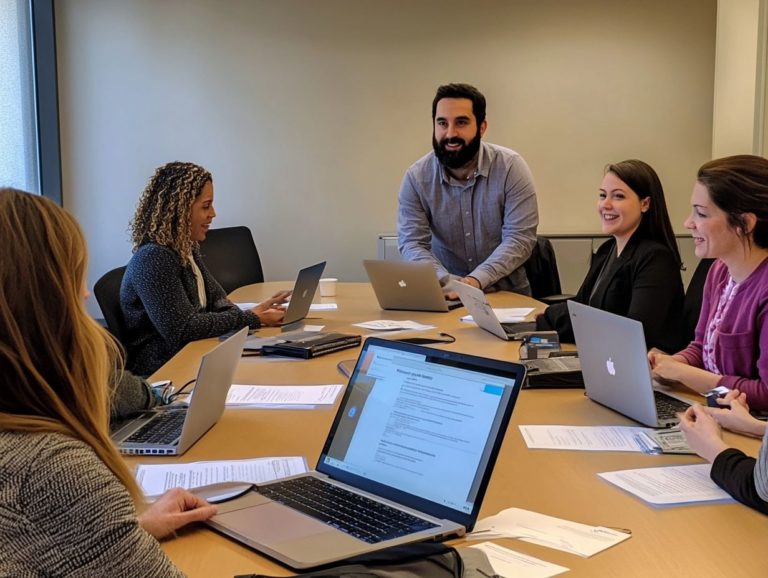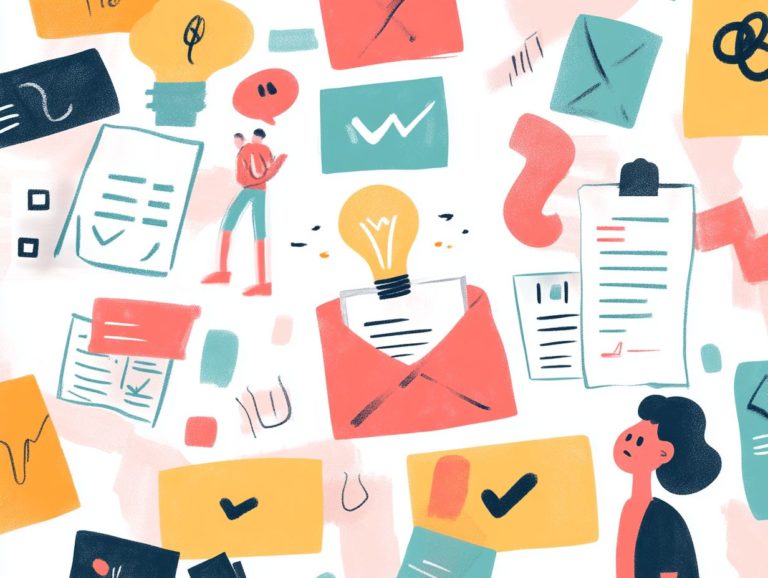“Facilitating CRM User Training Workshops Effectively”
In today s fast-paced business landscape, successful customer relationship management (CRM) hinges on having well-trained users. Effective CRM user training is crucial for unlocking the software’s full potential and ensuring smooth adoption across your teams.
This article delves into the importance of CRM user training, outlining how you can plan and prepare impactful workshops, along with techniques to engage your participants. It also addresses methods for evaluating workshop success and identifying areas for enhancement.
Explore the keys to facilitating successful CRM user training workshops and elevate your team’s performance.
Contents
- Key Takeaways:
- Understanding the Importance of CRM User Training
- Planning a Successful Training Workshop
- Preparing for the Workshop
- Conducting the Workshop
- Evaluating the Success of the Workshop
- Frequently Asked Questions
- What is the role of a facilitator in CRM user training workshops?
- How can I effectively facilitate a CRM user training workshop?
- What are some common challenges faced while facilitating CRM user training workshops?
- How can I ensure that the content of the CRM training workshop is effective?
- What are some tips for keeping participants engaged during a Customer Relationship Management (CRM) user training workshop?
- How can I measure the success of the Customer Relationship Management (CRM) user training workshop?
Key Takeaways:

- To plan a successful workshop, clearly identify goals and objectives, and choose appropriate training methods.
- Preparation is key for a smooth workshop, including gathering materials and creating a schedule.
Understanding the Importance of CRM User Training
Understanding the significance of CRM user training is paramount for any organization seeking to optimize its customer relationship management systems and elevate sales performance.
By investing in proper training, you empower your employees sales representatives and customer service teams alike to master complex software systems like monday.com and Make (Integromat).
Effective training not only helps your team adapt to new changes but also enriches the user experience. This ultimately promotes better adoption of CRM features that are vital for thriving in today s competitive business landscape.
Why Proper Training is Crucial for CRM Success
Proper training is absolutely vital for your CRM success, as it directly impacts user adoption, data integrity, and overall sales performance.
When your team is thoroughly trained, they gain confidence in navigating the CRM system. This confidence translates into improved customer interactions and stronger relationship management.
Hands-on workshops and tailored learning modules significantly boost user satisfaction. This makes your employees more inclined to embrace new technologies instead of resisting them.
For example, consider a company that rolled out a structured onboarding program paired with ongoing refresher courses. They experienced a notable increase in CRM usage and data accuracy.
By customizing the customer relationship management (CRM) system to align with your specific business needs, you can enhance the training experience. This allows your employees to recognize the direct benefits of a system tailored to their unique processes.
Planning a Successful Training Workshop
When planning a successful training workshop for CRM user training, it s essential to clearly identify your training goals.
Consider effective training methods that resonate with your audience. Prepare engaging materials that are specifically tailored to each user group.
This approach will make your workshop both engaging and effective don’t miss the chance to equip your team well!
Identifying Goals and Objectives
Identifying clear goals and objectives serves as the bedrock of any effective CRM user training program. This shapes both the structure and content of your training sessions.
By setting measurable targets, you ensure that the training addresses the diverse needs of users while also aligning with your organization’s broader strategic goals.
This alignment is essential; it cultivates a sense of ownership among users and encourages them to fully immerse themselves in the learning experience.
When employees recognize how their training contributes to the organization’s success, they are more inclined to apply what they learn. This ultimately boosts performance metrics.
This heightened engagement paves the way for a more successful adoption of CRM systems, leading to improved user satisfaction and enhanced overall business outcomes.
Choosing the Right Training Methods
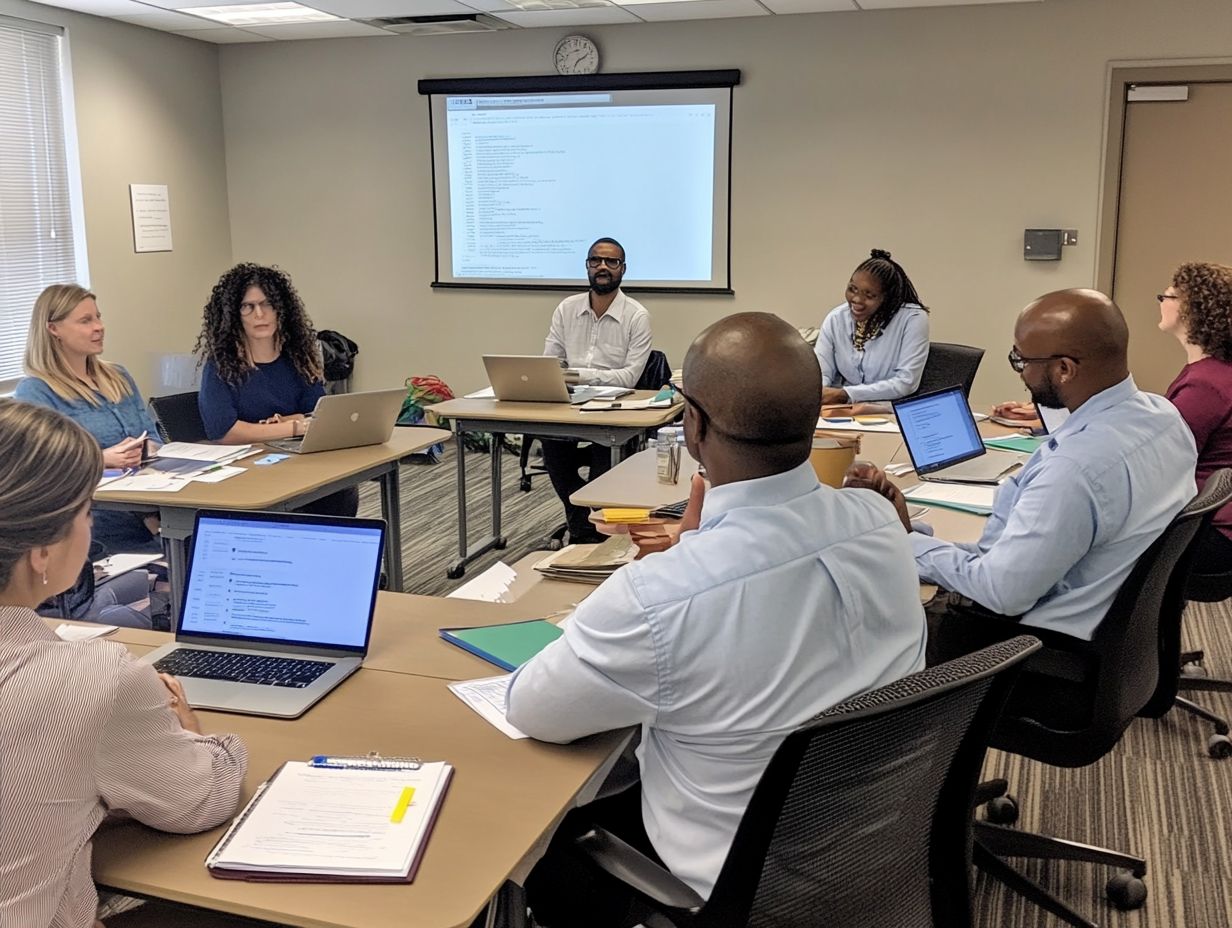
Choosing the right training methods is essential for maximizing user engagement. This ensures your CRM user training is both effective and efficient.
In today s rapidly evolving technological landscape, incorporating diverse approaches can significantly enhance the learning experience.
For instance, interactive training sessions foster real-time communication and collaboration among team members. This makes the process dynamic and engaging.
Using game-like elements can make learning more enjoyable. They help you retain knowledge more effectively through fun challenges and enticing rewards.
By leveraging online learning platforms like Pluralsight and Udemy, you gain the flexibility to access resources at your own pace. This allows you to tailor your journey to fit your needs.
Combining these methodologies optimizes your training resources. It also fosters a deeper understanding and mastery of the CRM system among users.
Preparing for the Workshop
Preparing for the workshop requires meticulously gathering all essential training materials and resources.
Craft a well-structured training schedule that caters to diverse learning styles. This ensures it promotes user engagement throughout the experience.
Gathering Necessary Materials and Resources
Gathering the necessary materials and resources for a successful CRM user training workshop is crucial. It directly influences the quality of the training experience.
To ensure you and your participants fully grasp the system, incorporate a variety of training materials.
Consider including detailed manuals that clearly outline core functionalities, alongside job aids for quick reference.
Engaging interactive exercises enhance understanding. They give users the opportunity to practice scenarios they’ll encounter in real life.
Comprehensive documentation on CRM features is vital to support learners on this journey.
Creating a user-friendly environment is vital! It ensures easy access to materials during training sessions. This fosters a seamless learning experience that encourages questions and collaboration.
Creating a Training Schedule
Creating a comprehensive training schedule is essential for establishing a clear workshop agenda. This enhances training efficiency and maximizes user engagement.
This schedule should seamlessly blend theoretical concepts with practical applications. You should grasp the material and know how to apply it effectively.
Include designated breaks to process information and refresh your mind. It also fosters connections with fellow attendees.
Engaging in interactive sessions further enriches understanding. This allows for collaboration and sharing of insights.
Implementing feedback loops is crucial. Regularly assessing comprehension helps the facilitator adjust the training pace, ensuring everyone stays on track and that lingering questions are addressed promptly.
Conducting the Workshop
Conducting the workshop effectively is crucial for cultivating a positive learning environment. This captivates participants and elevates their user experience with CRM systems.
Engaging Participants and Encouraging Participation
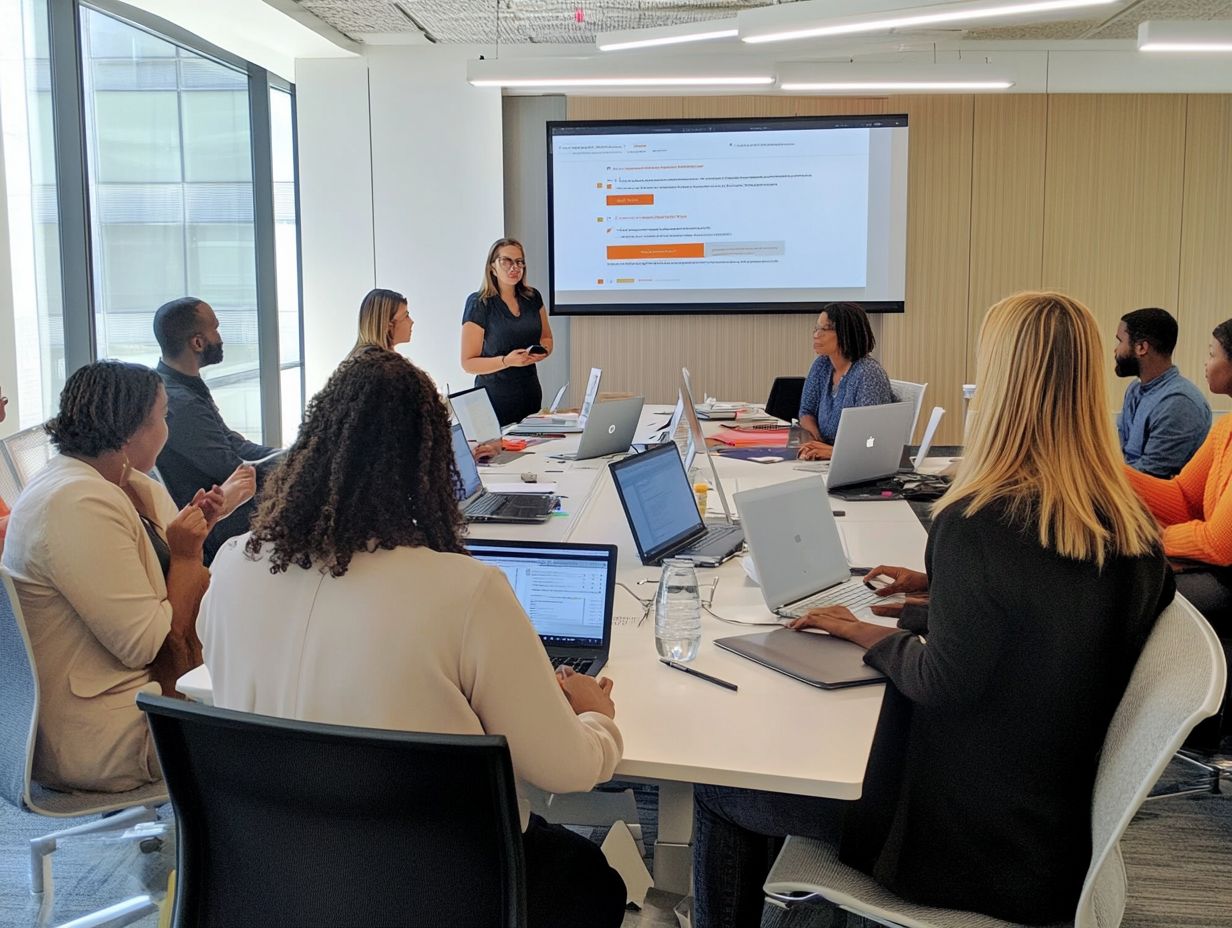
Engaging participants and motivating their involvement during the CRM user training workshop is essential. This cultivates a vibrant learning environment and ensures effective knowledge retention.
Employ interactive training methods that capture attention and stimulate active involvement. Techniques like role-playing scenarios and team-based problem-solving exercises transform complex concepts into something relatable and memorable.
Integrating gamification elements like points, badges, and friendly competition boosts motivation and participation levels. These strategies foster camaraderie among participants and create a more enjoyable atmosphere, helping to alleviate any initial resistance to change.
By making the training more engaging, you greatly enhance the chances of sustained adoption and long-term success.
Start planning your next training workshop today and watch your team’s engagement soar!
Effective Teaching Techniques
Effective teaching techniques are essential for enhancing user engagement and ensuring successful outcomes in your CRM user training sessions.
By incorporating a variety of methods, such as role-playing, scenario-based learning, and collaborative group activities, you can cultivate a dynamic learning environment. These strategies not only make the training more interactive but also empower participants to apply concepts in real-world situations.
For example, role-playing can immerse users in realistic scenarios, allowing them to sharpen their problem-solving skills. Engaging in group activities promotes teamwork and collective problem-solving, while scenario-based learning stimulates critical thinking.
Adapting these techniques thoughtfully can significantly boost performance metrics.
It also fosters a culture of continuous learning among your trainees.
Evaluating the Success of the Workshop
Evaluating the workshop’s success is crucial for the CRM user training program. It allows you to pinpoint areas that may require further enhancement and refinement, ensuring a continuous cycle of improvement.
Assessing Participant Understanding and Retention
Assessing your understanding and retention is crucial for measuring the effectiveness of CRM user training, ensuring that you can apply your knowledge with confidence.
By using different assessment methods like quizzes to test your immediate recall, practical exercises that mimic real-world scenarios, and lively group discussions that foster collaborative learning you can provide trainers with valuable insights into how well you’ve grasped the material.
These methods not only boost engagement but also link directly to performance metrics tied to CRM system usage and overall satisfaction.
Understanding your performance in these assessments can highlight areas for improvement, ultimately enhancing future training sessions and driving better CRM utilization across the board.
Identifying Areas for Improvement
Identifying areas for improvement after your CRM user training workshop is essential for refining future sessions and boosting user engagement.
By closely analyzing feedback from the training, you can find specific areas to improve. This analytical approach not only helps you uncover potential gaps in knowledge but also paves the way for integrating continuous learning opportunities.
Establishing effective feedback loops encourages users to actively share their experiences and suggestions, which is crucial for adapting training materials to keep pace with the ever-evolving features of the CRM system.
Nurturing a culture of ongoing development empowers users, ensuring they remain both competent and confident in utilizing the CRM effectively.
Frequently Asked Questions
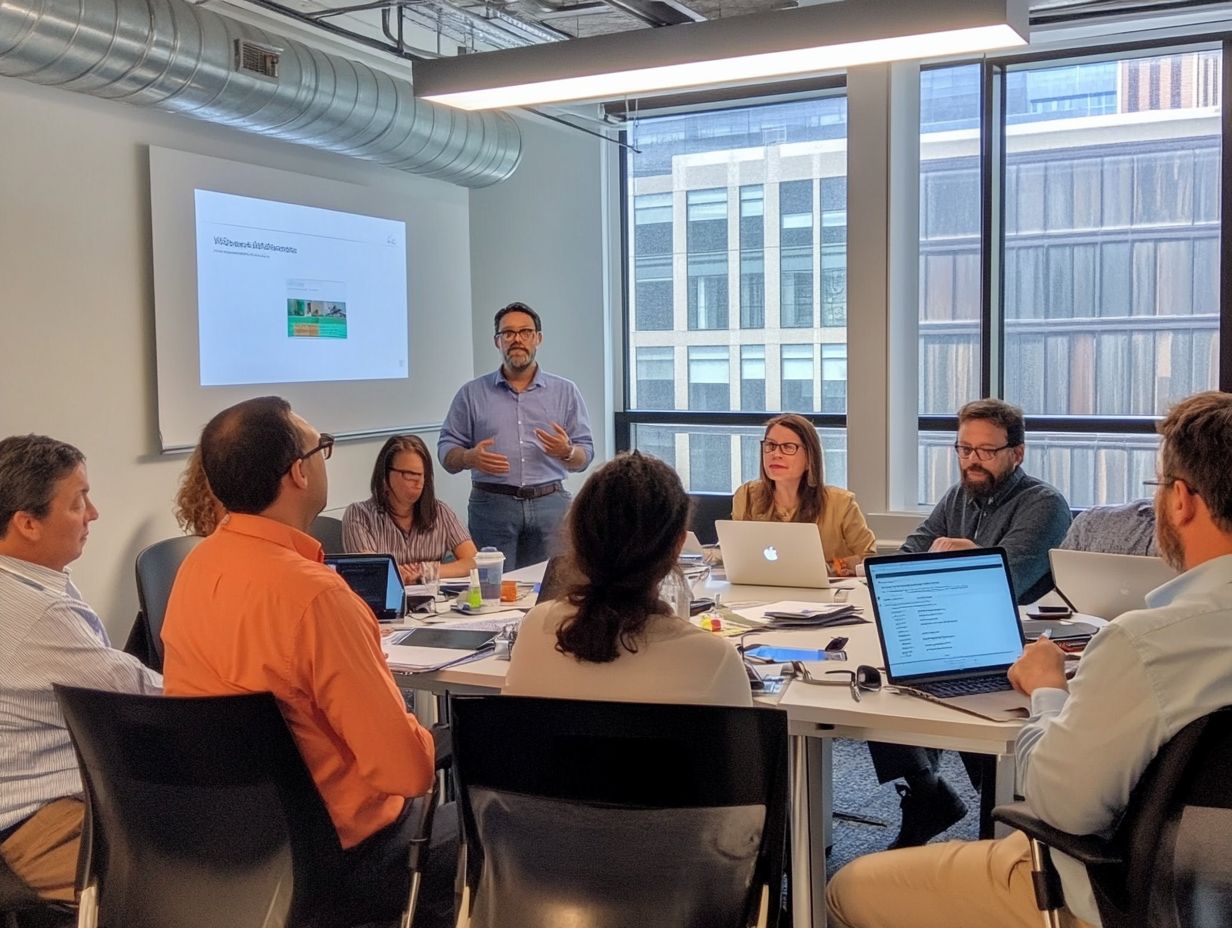
What is the role of a facilitator in CRM user training workshops?
A facilitator is responsible for guiding and managing the learning experience for participants in a CRM user training workshop. They ensure that the workshop progresses smoothly, encourages participation, and helps participants understand and apply the concepts being taught.
How can I effectively facilitate a CRM user training workshop?
To effectively facilitate a CRM user training workshop, it is important to have a detailed understanding of the CRM system, good communication skills, and the ability to adapt to different learning styles. The facilitator should also create a positive learning environment and be open to feedback from participants.
What are some common challenges faced while facilitating CRM user training workshops?
Some common challenges while facilitating CRM user training workshops include low participation levels, technical difficulties, and time constraints. Facilitators should anticipate these challenges and have a plan to overcome them, such as incorporating interactive activities to engage participants and testing equipment beforehand.
How can I ensure that the content of the CRM training workshop is effective?
To ensure the effectiveness of the CRM training workshop content, the facilitator should tailor it to the specific needs and skill levels of the participants. Regularly soliciting feedback and making adjustments accordingly can also improve the content and address any knowledge gaps.
What are some tips for keeping participants engaged during a Customer Relationship Management (CRM) user training workshop?
Keeping participants engaged in a Customer Relationship Management (CRM) user training workshop is crucial. Make the workshop interactive and relevant to their daily tasks.
Incorporate real-life scenarios, group activities, and hands-on exercises. These elements help participants stay engaged and effectively apply what they learn!
How can I measure the success of the Customer Relationship Management (CRM) user training workshop?
Measure the success of your Customer Relationship Management (CRM) user training workshop using various methods. Pre and post-training assessments, feedback surveys, and observing how well participants apply training in their daily tasks are effective approaches.
Gathering feedback is essential. This will help you continuously improve future sessions!


